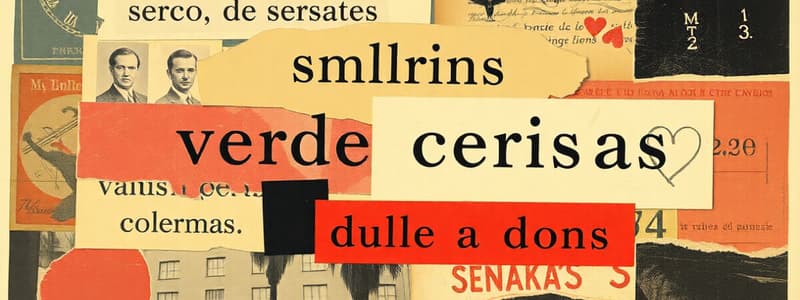Podcast
Questions and Answers
What does 'inteligente' mean in English?
What does 'inteligente' mean in English?
Which Spanish word means 'mother'?
Which Spanish word means 'mother'?
What is the Spanish word for 'house'?
What is the Spanish word for 'house'?
Which of the following Spanish words means 'water'?
Which of the following Spanish words means 'water'?
Signup and view all the answers
What does the Spanish word 'Lunes' mean in English?
What does the Spanish word 'Lunes' mean in English?
Signup and view all the answers
What does the Spanish verb 'Hablar' mean?
What does the Spanish verb 'Hablar' mean?
Signup and view all the answers
Which of the following is the correct translation of 'To eat'?
Which of the following is the correct translation of 'To eat'?
Signup and view all the answers
What does 'Buenos días' mean in English?
What does 'Buenos días' mean in English?
Signup and view all the answers
Which verb means 'to be' (temporary)?
Which verb means 'to be' (temporary)?
Signup and view all the answers
Which Spanish phrase means 'Thank you'?
Which Spanish phrase means 'Thank you'?
Signup and view all the answers
What does the Spanish word 'Feliz' mean?
What does the Spanish word 'Feliz' mean?
Signup and view all the answers
Which Spanish verb means 'to go'?
Which Spanish verb means 'to go'?
Signup and view all the answers
What is the meaning of the phrase '¿Cómo te llamas?'
What is the meaning of the phrase '¿Cómo te llamas?'
Signup and view all the answers
Flashcards
Smart
Smart
Having or showing a high mental capacity.
Old
Old
Having lived for many years; not young.
Friend
Friend
A person with whom one has a bond of mutual affection.
Hospital
Hospital
Signup and view all the flashcards
Book
Book
Signup and view all the flashcards
Hablar
Hablar
Signup and view all the flashcards
Comer
Comer
Signup and view all the flashcards
Estudiar
Estudiar
Signup and view all the flashcards
mirar
mirar
Signup and view all the flashcards
Gracias
Gracias
Signup and view all the flashcards
¿Dónde está…?
¿Dónde está…?
Signup and view all the flashcards
Tener
Tener
Signup and view all the flashcards
¿Cómo estás?
¿Cómo estás?
Signup and view all the flashcards
Study Notes
Spanish Vocabulary Study Notes
- Common Spanish Verbs (Infinitives):
- Regular -AR Verbs: Hablar (to speak), Bailar (to dance), Cantar (to sing), Caminar (to walk), Comprar (to buy), Escuchar (to listen), Estudiar (to study), Llamar (to call), Llegar (to arrive), Mirar (to look at), Necesitar (to need), Preguntar (to ask), Trabajar (to work), Viajar (to travel), Tomar (to take/drink)
- Regular -ER Verbs: Comer (to eat), Beber (to drink), Aprender (to learn), Correr (to run), Leer (to read), Vender (to sell), Romper (to break), Responder (to answer), Comprender (to understand), Prometer (to promise)
- Regular -IR Verbs: Vivir (to live), Escribir (to write), Abrir (to open), Recibir (to receive), Subir (to go up/climb), Compartir (to share), Asistir (to attend)
- Irregular Verbs: Tener (to have), Ser (to be - permanent), Estar (to be - temporary), Hacer (to do/make), Poder (to be able to/can), Ir (to go), Querer (to want), Decir (to say/tell), Ver (to see), Saber (to know - facts), Conocer (to know - people/places), Venir (to come), Poner (to put/place), Dar (to give), Salir (to leave/go out), Traer (to bring), Jugar (to play), Dormir (to sleep)
Common Spanish Phrases:
-
Basic Phrases: Hola (hello), Buenos días (good morning), Buenas tardes (good afternoon), Buenas noches (good night), Adiós (goodbye), ¿Cómo estás? (how are you?), Estoy bien/mal/regular (I am good/bad/okay), Mucho gusto (nice to meet you), Gracias (thank you), De nada (you’re welcome), Lo siento (I'm sorry), No entiendo (I don't understand), ¿Cuánto cuesta? (how much does it cost?), ¿Dónde está…? (where is…?), Me gusta… (I like…)
-
Conversational Phrases: ¿Puedes ayudarme? (can you help me?), No sé (I don't know), Tengo hambre (I am hungry), Tengo sed (I am thirsty), Estoy cansado/a (I am tired), ¿Qué hora es? (what time is it?), ¿Qué pasa? (what's up?), ¿Qué haces? (what are you doing?), ¿Cómo te llamas? (what is your name?), Me llamo… (my name is…)
-
Adjectives (Describing): Feliz (happy), Triste (sad), Grande (big), Pequeño/a (small), Rápido/a (fast), Lento/a (slow), Fácil (easy), Difícil (difficult), Bonito/a (pretty), Feo/a (ugly), Alto/a (tall), Bajo/a (short), Delgado/a (thin), Gordo/a (fat), Fuerte (strong), Débil (weak), Inteligente (smart), Estúpido/a (stupid), Viejo/a (old), Joven (young)
-
Relationships & People: Amigo/a (friend), Hermano/a (brother/sister), Padre (father), Madre (mother), Abuelo/a (grandfather/grandmother), Niño/a (boy/girl), Maestro/a (teacher), Estudiante (student), Hombre (man), Mujer (woman)
-
Common Locations & Objects: Casa (house), Escuela (school), Trabajo (work), Biblioteca (library), Hospital (hospital), Restaurante (restaurant), Tienda (store), Playa (beach), Iglesia (church), Ciudad (city). Foods: Comida (food), Agua (water), Pan (bread), Leche (milk), Jugo (juice), Café (coffee), Té (tea), Carne (meat), Pollo (chicken), Pescado (fish), Teléfono (phone), Dinero (money) Ropa (clothes), Coche/Carro (car), Llave (key), Televisión (TV), Computadora(computer), Libro (book), Papel (paper), Bolígrafo (pen)
-
Question Words: ¿Qué? (what?), ¿Quién? (who?), ¿Cuándo? (when?), ¿Dónde? (where?), ¿Por qué? (why?), ¿Cómo? (how?), ¿Cuánto/a? (how much?), ¿Cuántos/as? (how many?), ¿Cuál? (which?)
-
Days of the Week: Lunes (Monday), Martes (Tuesday), Miércoles (Wednesday), Jueves (Thursday), Viernes (Friday), Sábado (Saturday), Domingo (Sunday)
-
Months of the Year: Enero (January), Febrero (February), Marzo (March), Abril (April), Mayo (May), Junio (June), Julio (July), Agosto (August), Septiembre (September), Octubre (October), Noviembre (November), Diciembre (December)
Studying That Suits You
Use AI to generate personalized quizzes and flashcards to suit your learning preferences.
Description
Explore common Spanish verbs with a focus on regular -AR, -ER, and -IR verbs, along with essential irregular verbs. This study note covers verbs such as hablar, comer, vivir, tener, ser, and more. Learn to expand your Spanish vocabulary.




